Our friendly British advertising watchdog has done it again by banning a Lexus magazine advert for the RX 400h on the grounds of false claims! For those of you with a hefty memory, the British Advertising Standards Agency (ASA) had banned Ford’s “Focus Zetec Climate” TV ad last year due to complaints from two viewers who said that it was misleading.
The magazine ad for the Lexus RX 400h was headlined “HIGH PERFORMANCE. LOW EMISSIONS. ZERO GUILT”. Following the picture of the SUV, there was a text stating “RX 400h. The world’s first high performance hybrid SUV … category-leading low CO2 emissions. A combination without equal. Or compromise”. In the small print, Lexus stated that the RX 400h’s carbon dioxide emissions figure was 192g/km CO2. -Continued: Click “Read More…” below
ASA received 10 complainants stating that Lexus’ advert was misleading as it falsely implied that the SUV caused little or no harm to the environment. Lexus argued that the CO2 emissions of the RX 400h were very low compared to those of core competitors within its category and that the prominence of the illustration of the vehicle in the ad clarified the type of car the headline claims referred to and also the class of vehicle to which they applied.
The British advertising watchdog wasn’t convinced. In their release, they scold Lexus not to imply in future that a car caused little or no harm to the environment and had low CO2 emissions in comparison with all cars if that was not the case. Ouch…
ASA PRESS RELEASE
Ad
A magazine ad, for a Lexus RX 400h car, was headlined “HIGH PERFORMANCE. LOW EMISSIONS. ZERO GUILT”. Accompanying an illustration of the product, text stated “RX 400h. The world’s first high performance hybrid SUV … category-leading low CO2 emissions. A combination without equal. Or compromise”. Text at the foot of the ad stated “… CO2 emissions 192g/km
Issue
Ten complainants believed the claims “LOW EMISSIONS” and “ZERO GUILT” misleadingly implied the car caused little or no harm to the environment and gave a misleading impression of the car’s carbon dioxide (CO2) emissions in comparison with other vehicles. They argued that the “192g/km” emissions figure was high when compared to the emissions of all cars.
Response
Lexus said they had sought approval from the CAP Copy Advice team before launching the ad and explained that, at 192g/km, the CO2 emissions of the RX 400h were very low compared to those of core competitors within its category. They submitted a chart, which compared the fuel emissions of the RX 400h with other vehicles they said were in the same class and showed that the emissions figure of 192g/km was the lowest of all those cars.
Lexus argued that the prominence of the illustration of the vehicle in the ad clarified the type of car the headline claims referred to and also the class of vehicle to which they applied. They believed readers of the ad would understand that the claims were made in relation to sports utility vehicles (SUV) only.
Assessment
Upheld
The ASA acknowledged that, based on the evidence submitted, the CO2 emissions rate for the RX 400h was low compared to other cars in its class. We considered, however, that the headline claim “HIGH PERFORMANCE. LOW EMISSIONS. ZERO GUILT” implied the vehicle’s emission rate was low regardless of category and readers were likely to understand from it that the car caused little or no harm to the environment, which was not the case, and had low emissions in comparison with all cars, which was also not the case. We noted the body text, which stated ” … category-leading low CO2 emissions …”, clarified that the low emissions claim was made in the context of the cars category only, but considered that that was not prominent enough or linked to the headline claim. Because of that, and because the words “ZERO GUILT” implied the car was environmentally friendly, we concluded that the headline claim was likely to mislead.
The ad breached CAP Code clauses 7.1 (Truthfulness), 19.1 (Other comparisons) and 49.1 (Environmental claims)..
Action
We told Lexus not to imply in future that a car caused little or no harm to the environment and had low CO2 emissions in comparison with all cars if that was not the case.







